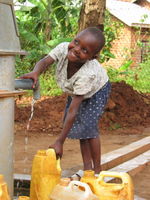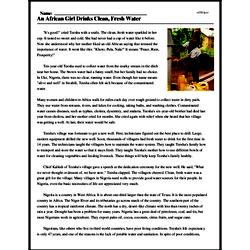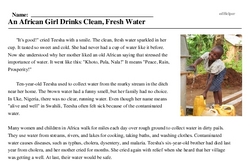An African Girl Drinks Clean, Fresh Water
"It's good!" cried Teesha with a smile. The clean, fresh water sparkled in her cup. It tasted so sweet and cold. She had never had a cup of water like it before. Now she understood why her mother liked an old African saying that stressed the importance of water. It went like this: "Khoto, Pula, Nala!" It means "Peace, Rain, Prosperity!"
Ten-year-old Teesha used to collect water from the murky stream in the ditch near her home. The brown water had a funny smell, but her family had no choice. In Uke, Nigeria, there was no clear, running water. Even though her name means "alive and well" in Swahili, Teesha often felt sick because of the contaminated water.
Many women and children in Africa walk for miles each day over rough ground to collect water in dirty pails. They use water from streams, rivers, and lakes for cooking, taking baths, and washing clothes. Contaminated water causes diseases, such as typhus, cholera, dysentery, and malaria. Teesha's six-year-old brother had died last year from cholera, and her mother cried for months. She cried again with relief when she heard that her village was getting a well. At last, their water would be safe.




